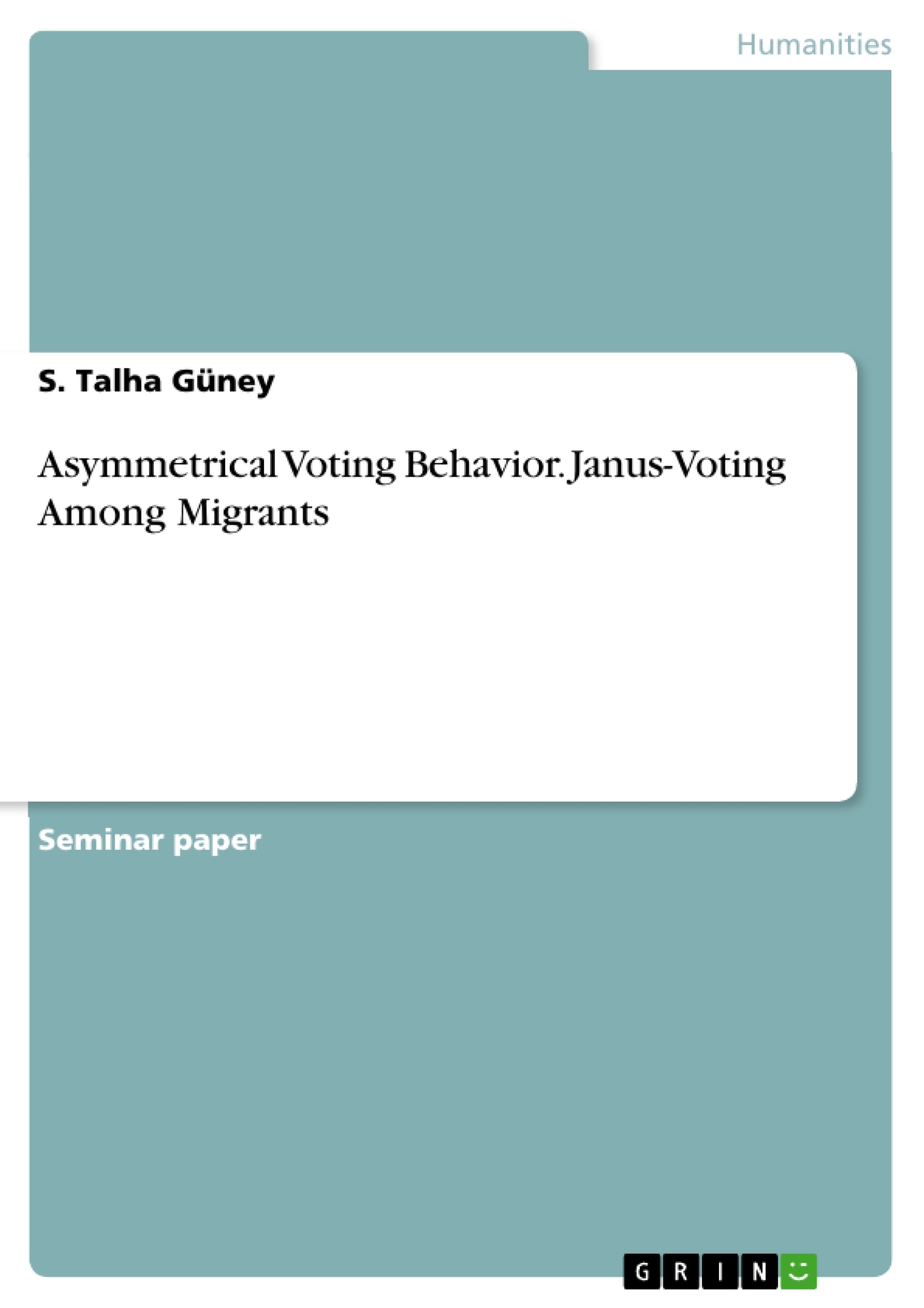There are cases in which the same electorate casts votes for ideologically detached candidates and parties in a short time-span. Migrants with dual voting rights often fall in this category. Examining the Turkish diaspora in Germany, the author hypothesizes that social identity and cross-generational interaction terms have influence on attitudes towards parties.
He explores their effects on the probability of voting for a certain party by proposing logistic regression using maximum likelihood estimation. Introducing a new theoretical model addressing value shifts, this study also yields policy recommendations for social and integration issues.
Inhaltsverzeichnis (Table of Contents)
- Introduction
- Literature
- Internal and External Voting Behaviour
- Dual Citizenship and Voting
- Deviant Migrant Voting Behaviour
- Theory
- Hypothesis H1a: Migrants Vote Egocentrically and Retrospectively in the Country of Immigration.
- Hypothesis H1b: Migrants Vote Sociotropically and Prospectively in the Country of Emigration.
- Hypothesis H2: (Environmental) Socioeconomic Determinants Affect the Vote Choice.
- Research Design
- Data
- Limitations
- Response Variables
- Explanatory Variables
- Regression
- Results
- Discussion
Zielsetzung und Themenschwerpunkte (Objectives and Key Themes)
This study aims to examine the puzzling voting behaviour of migrants in both their country of immigration and emigration. It explores the reasons behind ideologically divergent voting choices by analyzing the influence of social identity, family attributes, and economic voting variables.
- Dual voting behaviour of migrants
- Social identity and cross-generational interactions
- Influence of economic voting variables
- Value shift model
- Integration policies
Zusammenfassung der Kapitel (Chapter Summaries)
- Introduction: Introduces the topic of migrant voting, particularly the "Janus-voting" phenomenon, where migrants vote for ideologically detached candidates in their country of origin and host country. The study focuses on Turkish immigrants in Germany and aims to identify the key determinants of this behaviour.
- Literature: Reviews existing literature on migrant voting behaviour, highlighting the limited research on dual voting patterns. It explores the complexities of dual citizenship and its impact on integration in the host country. The chapter examines the controversy surrounding migrant voting in the origin country and its potential influence on integration processes.
- Theory: Proposes a theoretical framework based on the value shift model, which explains the gradual change of beliefs and values over time. It introduces two main hypotheses: Hypothesis H1a and H1b, which suggest that migrants tend to vote egocentrically and retrospectively in their country of immigration, while voting sociotropically and prospectively in their country of emigration.
- Research Design: Details the research methodology, using a quantitative large-N approach based on the "2000 Families" dataset. The chapter describes the data sources, limitations, response variables, and explanatory variables. It outlines the regression analysis used to test the hypotheses.
Schlüsselwörter (Keywords)
This study explores the key themes of migrant voting behaviour, specifically focusing on dual citizenship, social identity, cross-generational interactions, economic voting, and the value shift model. It examines the implications of these factors for integration policies and seeks to understand the motivations behind Janus-voting among Turkish immigrants in Germany.
Frequently Asked Questions
What is "Janus-voting" among migrants?
Janus-voting refers to the phenomenon where migrants with dual voting rights cast votes for ideologically detached or contradictory candidates in their host country versus their country of origin.
Which migrant group is the focus of this study?
The study specifically examines the Turkish diaspora living in Germany and their voting behavior in both German and Turkish elections.
What is the "value shift model" proposed in the research?
It is a theoretical model that explains how the beliefs and values of migrants change over time and across generations, influencing their political choices.
How do economic factors influence migrant voting?
The author hypothesizes that migrants vote egocentrically and retrospectively in their country of immigration (based on personal gain), but sociotropically and prospectively in their country of emigration (based on the country's future).
What data was used for this analysis?
The study utilizes a quantitative approach based on the "2000 Families" dataset, applying logistic regression and maximum likelihood estimation.
What are the implications for integration policy?
The findings yield recommendations for social and integration issues by showing how dual citizenship and cross-generational interactions affect political attitudes.
- Arbeit zitieren
- S. Talha Güney (Autor:in), 2021, Asymmetrical Voting Behavior. Janus-Voting Among Migrants, München, GRIN Verlag, https://www.grin.com/document/997378



